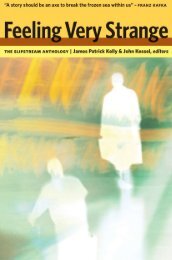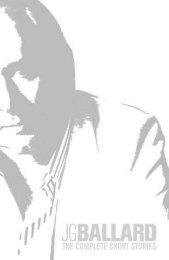The Curse of the Wer.. - Site de Thomas - Free
The Curse of the Wer.. - Site de Thomas - Free
The Curse of the Wer.. - Site de Thomas - Free
You also want an ePaper? Increase the reach of your titles
YUMPU automatically turns print PDFs into web optimized ePapers that Google loves.
WEREWOLVES AND SCHOLARS<br />
a touch <strong>of</strong> doubt concerning <strong>the</strong> a<strong>de</strong>quacy <strong>of</strong> increasingly mechanistic<br />
mo<strong>de</strong>s <strong>of</strong> explanation. Mr Fitz-Poodle experiences a disturbing dream,<br />
which influences his <strong>de</strong>cision not to accompany his wife on a shopping<br />
trip <strong>the</strong> following day, a <strong>de</strong>velopment that is explained in <strong>the</strong> following<br />
terms: ‘Dreams, although we disbelieve in <strong>the</strong>m — we wise ones — have<br />
still some influence over our waking thoughts. … <strong>The</strong> complex machine<br />
called Man is not so well put toge<strong>the</strong>r as to be always in perfect or<strong>de</strong>r.’ 26<br />
In this passage, it is suggested that explanations which insist upon <strong>the</strong><br />
explicability <strong>of</strong> all phenomena in terms <strong>of</strong> physical causes and effects<br />
(such as conceptualizations <strong>of</strong> <strong>the</strong> human body in terms <strong>of</strong> machinery)<br />
cannot satisfactorily explain all human behaviour, and for this reason<br />
a romantic fascination for <strong>the</strong> significance <strong>of</strong> dreams is shown to have<br />
a continuing appeal.<br />
At least on <strong>the</strong> surface <strong>of</strong> things, however, a more rationalist approach<br />
did prevail in <strong>the</strong> mid-nineteenth century, un<strong>de</strong>r <strong>the</strong> aegis <strong>of</strong><br />
science. 27 Unlike romantic science, which visualized <strong>the</strong> connectivity<br />
<strong>of</strong> <strong>the</strong> physical and metaphysical, mid-nineteenth-century science was<br />
pr<strong>of</strong>oundly materialist, insisting upon <strong>the</strong> foundation <strong>of</strong> all things in<br />
<strong>the</strong> physical laws <strong>of</strong> nature. Auguste Comte exemplified this ten<strong>de</strong>ncy<br />
in his elaboration <strong>of</strong> ‘positivism’ or <strong>the</strong> argument that all knowledge<br />
should be foun<strong>de</strong>d upon <strong>the</strong> observation and analysis <strong>of</strong> <strong>the</strong> external<br />
or apparent characteristics <strong>of</strong> phenomena. In<strong>de</strong>ed, Comte argued that<br />
human culture was <strong>de</strong>veloping from what he termed <strong>the</strong> ‘<strong>the</strong>ological<br />
state’, in which supernatural fictions constituted explanatory systems,<br />
through <strong>the</strong> ‘metaphysical state’, in which supernatural fictions were<br />
replaced by abstract concepts, into <strong>the</strong> scientific or ‘positive’ state,<br />
which he saw as <strong>the</strong> final stage <strong>of</strong> knowledge. <strong>The</strong> gradual disassociation<br />
<strong>of</strong> <strong>the</strong> werewolf from <strong>the</strong> realm <strong>of</strong> <strong>the</strong> supernatural, and its increasing<br />
representation in <strong>the</strong> nineteenth century as a phenomenon or<br />
belief <strong>de</strong>riving from natural causes, would in fact suggest that Comte’s<br />
i<strong>de</strong>as were in many ways an accurate <strong>de</strong>scription <strong>of</strong> shifting analytical<br />
strategies. <strong>The</strong> scientific philosophy exemplified by Comte, however,<br />
while it foregroun<strong>de</strong>d <strong>the</strong> laws <strong>of</strong> nature as <strong>the</strong> building blocks <strong>of</strong> all<br />
knowledge, still ten<strong>de</strong>d to <strong>de</strong>base nature by objectifying it as a plenum<br />
to be acted upon, controlled and manipulated by humankind.<br />
19





